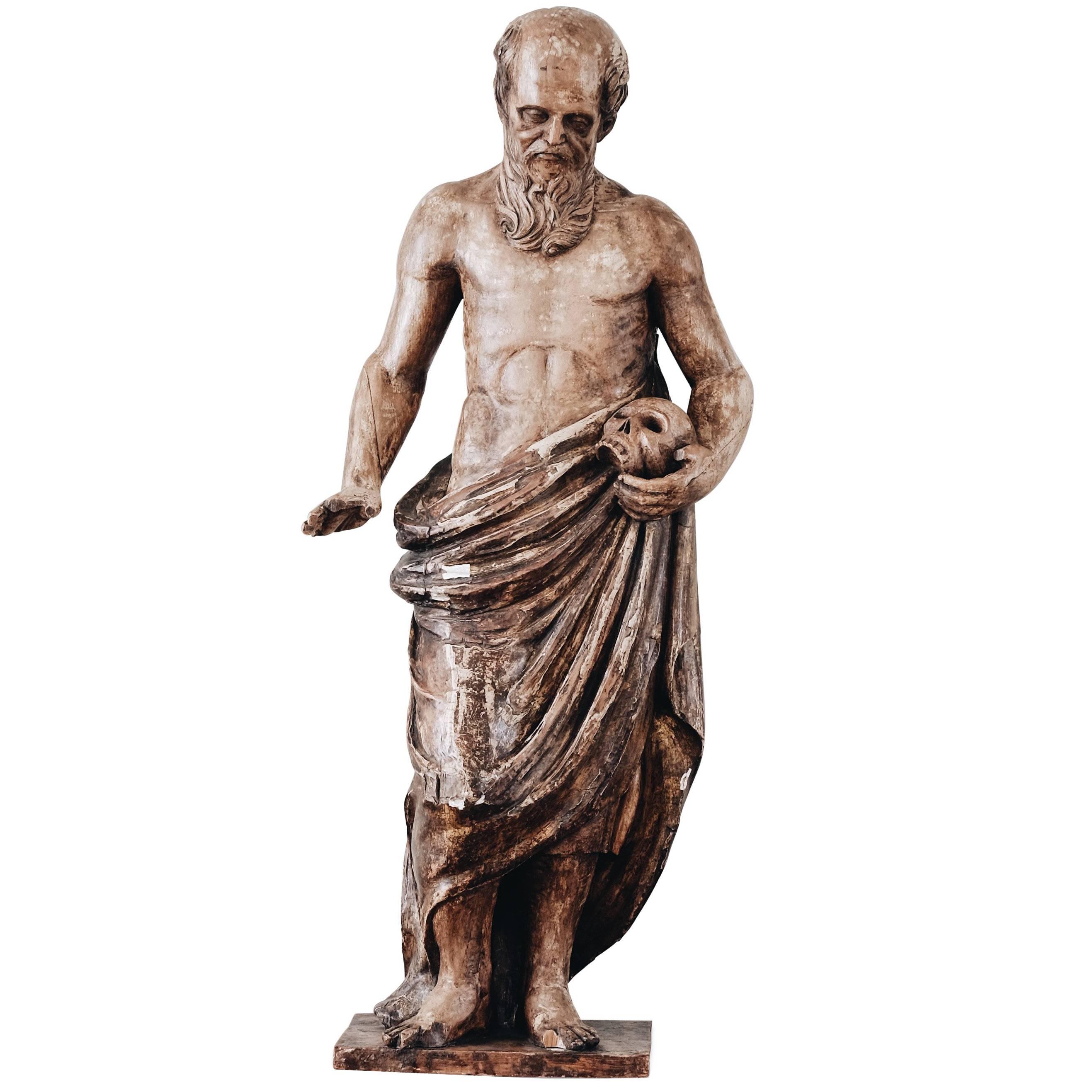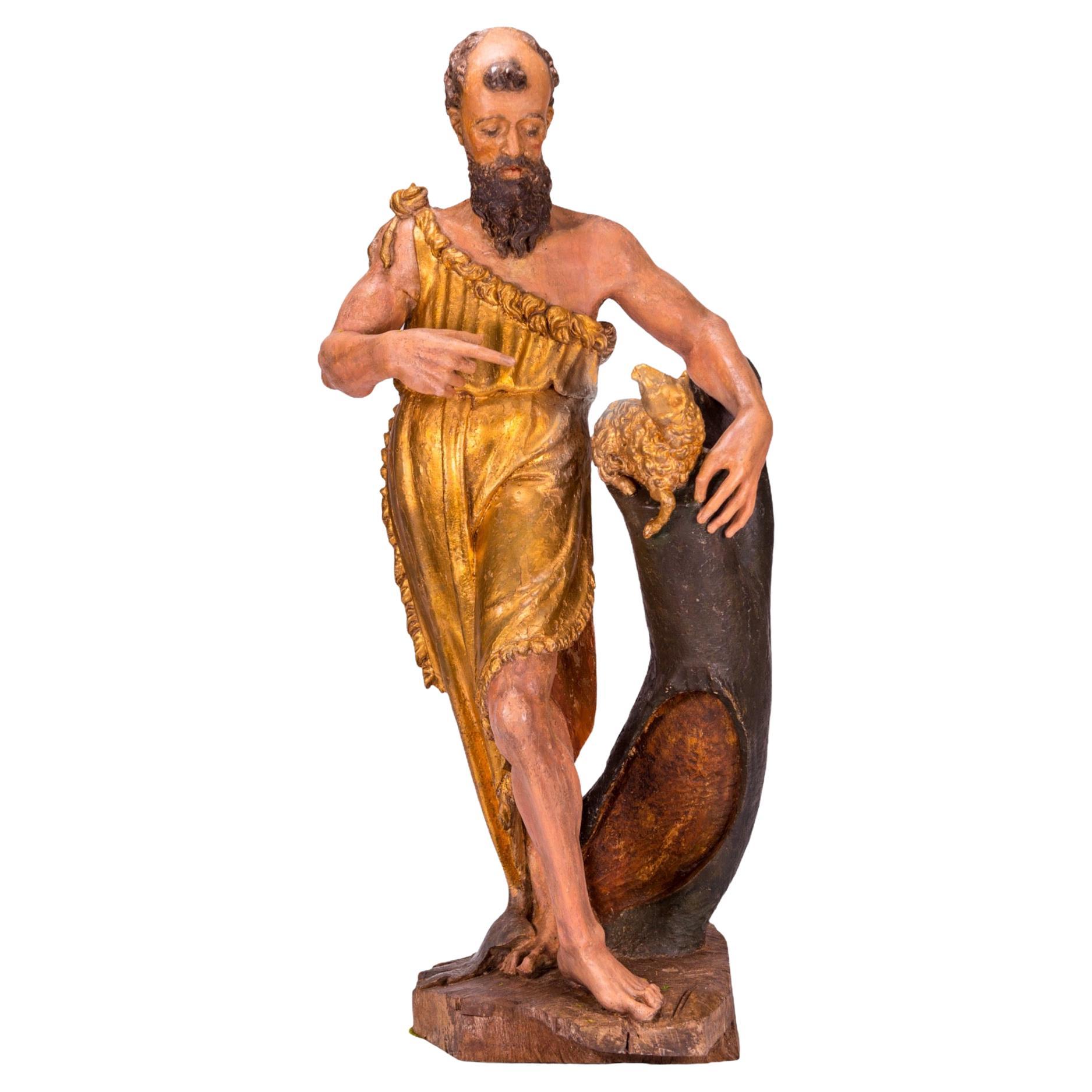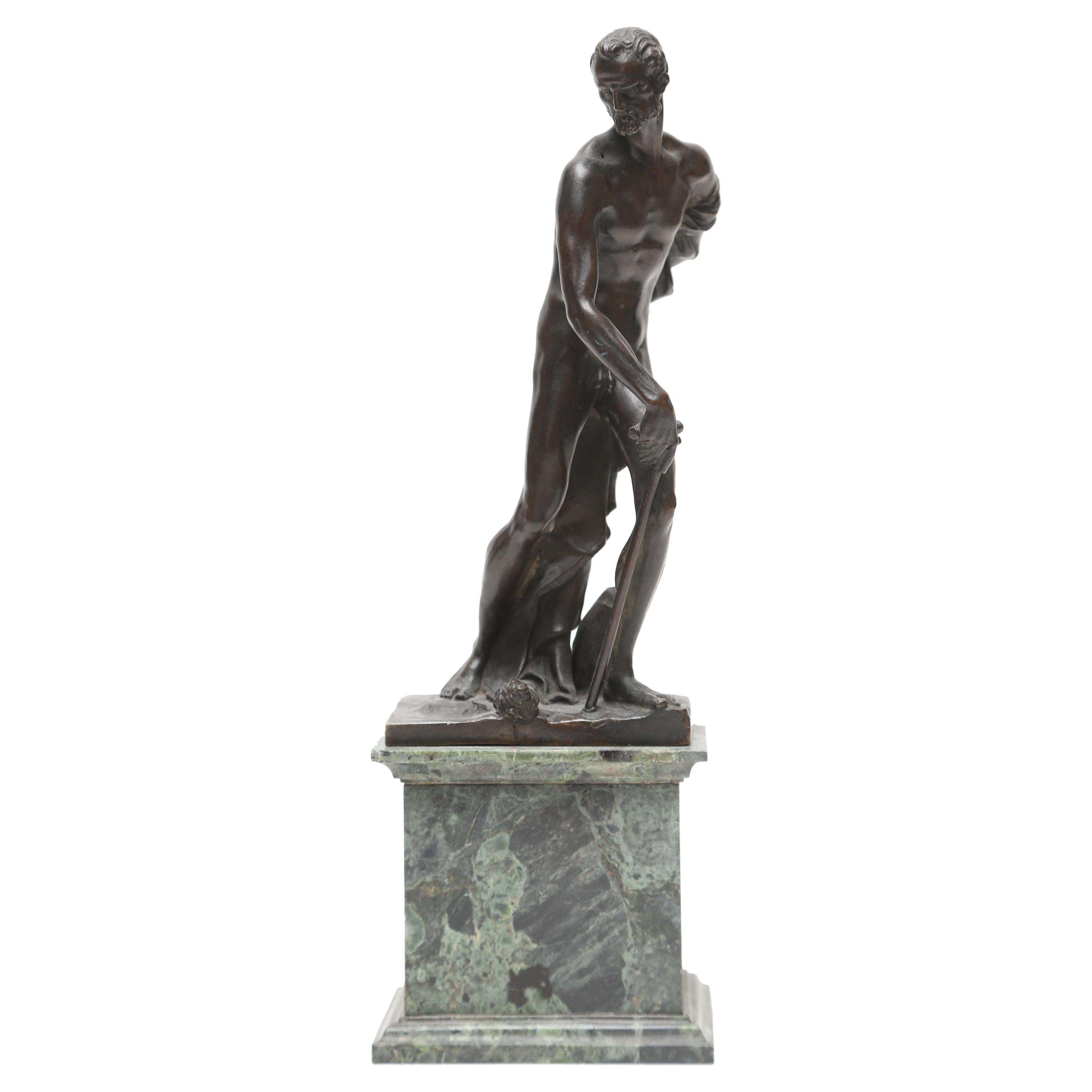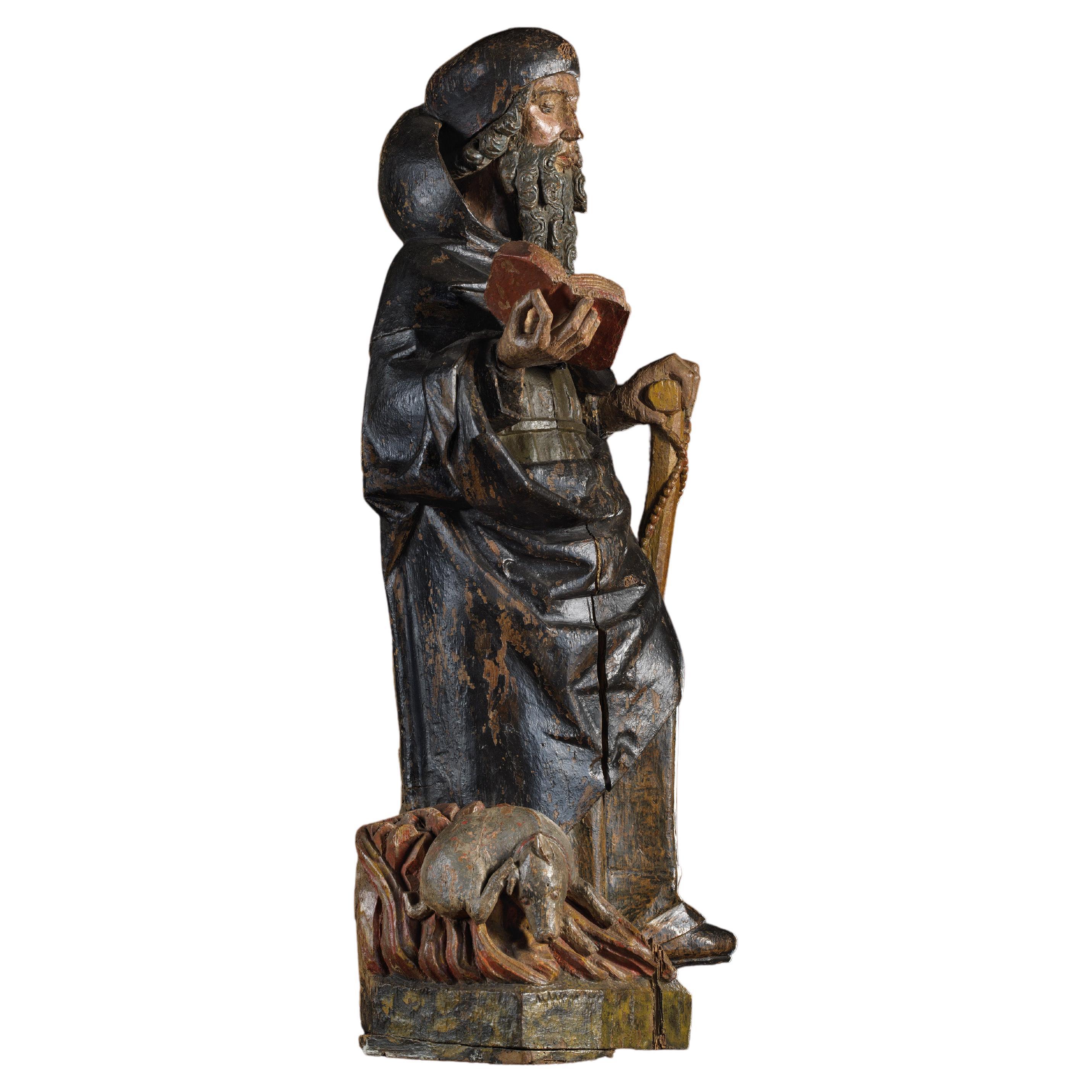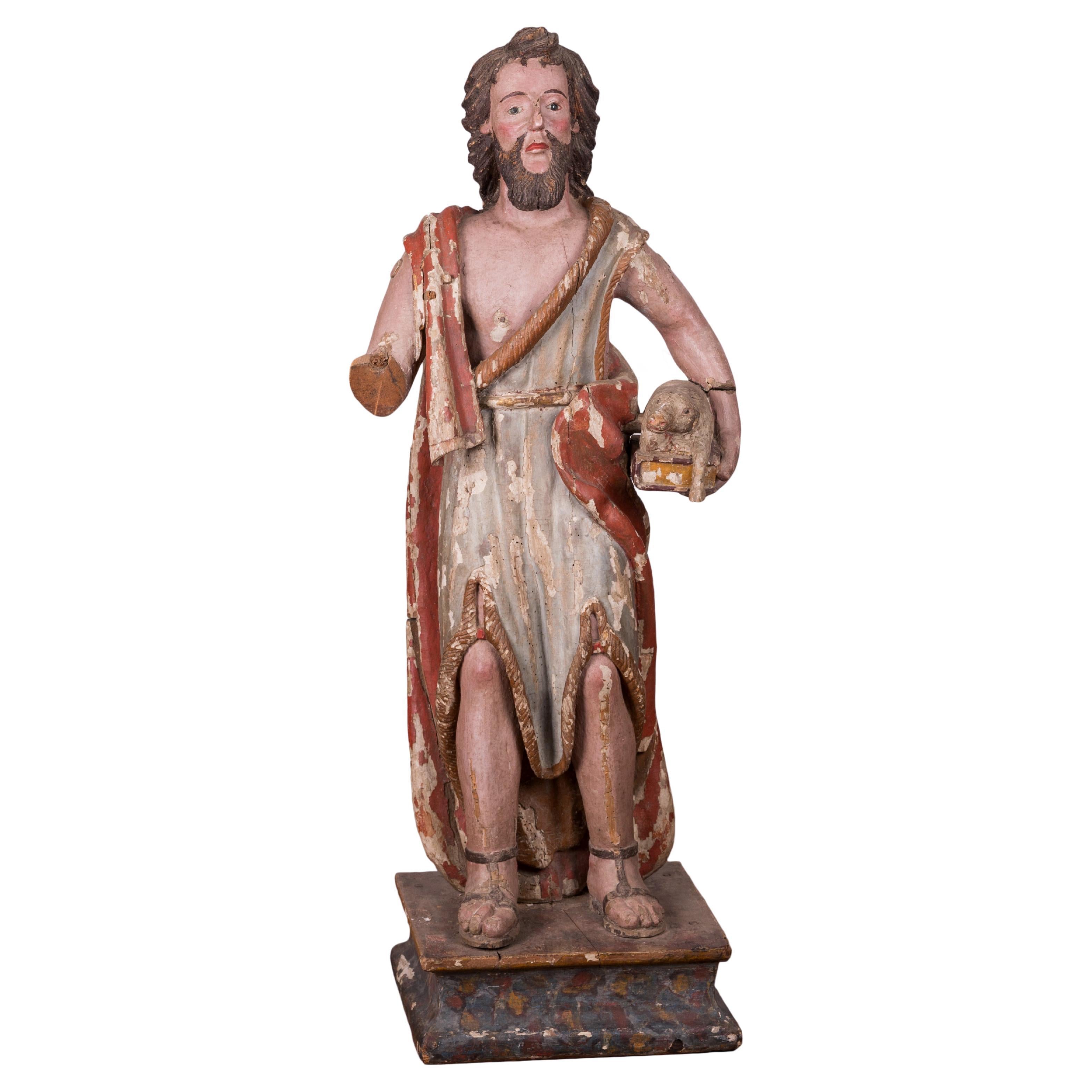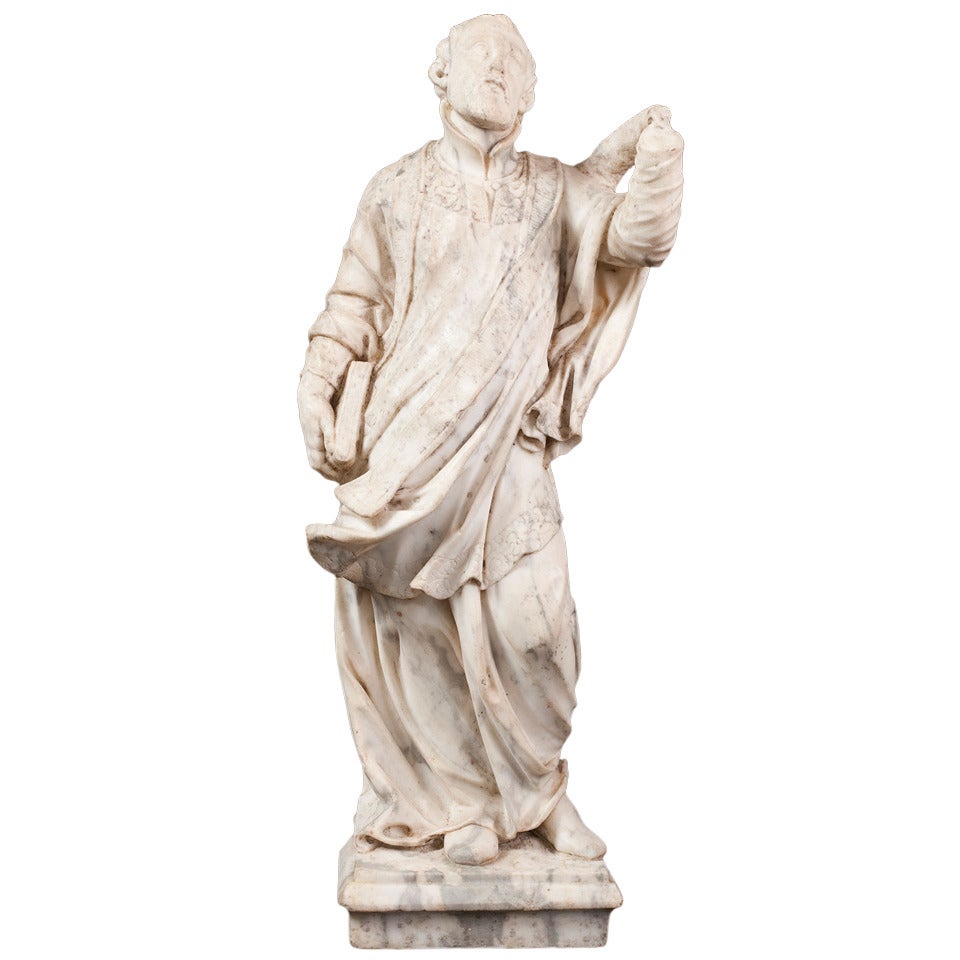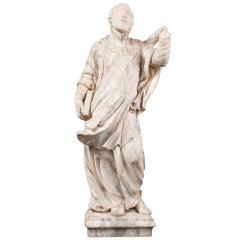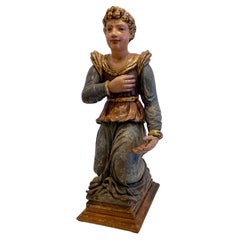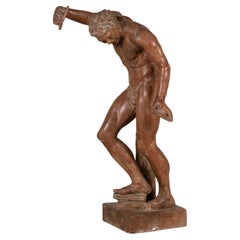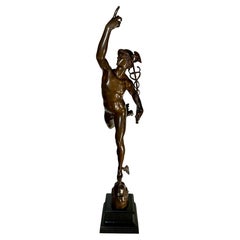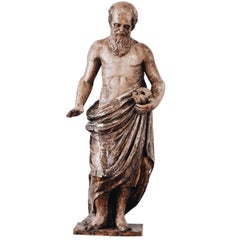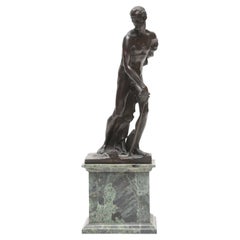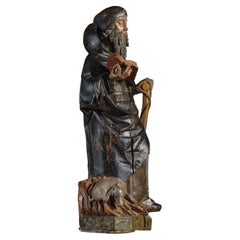Items Similar to Spanish Sculpture of Saint Jerome, Late 17th Century
Want more images or videos?
Request additional images or videos from the seller
1 of 8
Spanish Sculpture of Saint Jerome, Late 17th Century
$3,000
£2,277.55
€2,605.03
CA$4,191.44
A$4,661.79
CHF 2,434.24
MX$56,729.03
NOK 31,088.99
SEK 29,155.99
DKK 19,442.34
Shipping
Retrieving quote...The 1stDibs Promise:
Authenticity Guarantee,
Money-Back Guarantee,
24-Hour Cancellation
About the Item
A late 17th-century Spanish wood sculpture of a penitent Saint Jerome, possibly Seville, circa 1680.
Spanish religious sculpture of the 17th century is one of the most intense artistic representations. The Catholic Church during the struggle against Protestantism pushed Spanish sculptors to represent images of Jesus, Our Lady, and all the saints to the best of their sculptural experience.
- Dimensions:Height: 21 in (53.34 cm)Width: 12 in (30.48 cm)Depth: 9 in (22.86 cm)
- Style:Baroque (Of the Period)
- Materials and Techniques:
- Place of Origin:
- Period:
- Date of Manufacture:circa 1680
- Condition:Wear consistent with age and use. Minor losses.
- Seller Location:CH
- Reference Number:1stDibs: LU97781401782
About the Seller
5.0
Recognized Seller
These prestigious sellers are industry leaders and represent the highest echelon for item quality and design.
1stDibs seller since 2013
42 sales on 1stDibs
Typical response time: 1 hour
- ShippingRetrieving quote...Shipping from: Bissone, Switzerland
- Return Policy
Authenticity Guarantee
In the unlikely event there’s an issue with an item’s authenticity, contact us within 1 year for a full refund. DetailsMoney-Back Guarantee
If your item is not as described, is damaged in transit, or does not arrive, contact us within 7 days for a full refund. Details24-Hour Cancellation
You have a 24-hour grace period in which to reconsider your purchase, with no questions asked.Vetted Professional Sellers
Our world-class sellers must adhere to strict standards for service and quality, maintaining the integrity of our listings.Price-Match Guarantee
If you find that a seller listed the same item for a lower price elsewhere, we’ll match it.Trusted Global Delivery
Our best-in-class carrier network provides specialized shipping options worldwide, including custom delivery.More From This Seller
View AllMarble Sculpture of a Saint, Late 17th Century
Located in CH
A late 17th century marble sculpture of a saint, possibly Central Italian. Monogrammed on the marble base "F G F."
Category
Antique Late 17th Century Italian Baroque Sculptures
Materials
Marble
Italian Painted and Lacquered Wooden Sculpture of a Kneeling Figure, Circa 1650
Located in CH
Italian Baroque painted and lacquered wooden sculpture of a kneeling figure. Circa 1650.
Category
Antique Mid-17th Century Italian Baroque Figurative Sculptures
Materials
Wood
Italian 19th C. Grand Tour Terracotta of a "Fauno Danzante Con Cimbali" ca. 1860
Located in CH
Italian 19th Century Grand Tour Terracotta of a "Fauno Danzante con Cimbali" Circa 1860
The statue depicts a satyr dancing and playing; in his right hand he holds the rattlesnakes...
Category
Antique 19th Century Italian Grand Tour Figurative Sculptures
Materials
Terracotta
French Bronze Sculpture of "Mercurio Volante" by F. Barbedienne Fondeur, Ca.1850
By F. Barbedienne Foundry
Located in CH
French Bronze Sculpture of Mercury Signed F. Barbedienne Fondeur, Ca. 1850.
This bronze statue of Mercury Volante is a copy of the late 16th Century bronze by the great French/Flemish/Italian sculptor Giambologna. The statue, signed Ferdinand Barbedienne Fondeur...
Category
Antique 1850s French Renaissance Revival Figurative Sculptures
Materials
Bronze
Italian Large Bronze Relief of Madonna and Child with Saints, Circa 1850
Located in CH
Italian Large Bronze Relief of a Madonna and Child, Saint John and Saint Elizabeth, after Pierino da Vinci, Circa 1850
This 19th century bronze plaque...
Category
Antique Mid-19th Century Italian Renaissance Revival Figurative Sculptures
Materials
Bronze
Italian Venetian Secretary, 18th Century
Located in CH
An early 18th century Italian Venetian walnut and burl walnut veneered secretary with serpentine base and mirrored upper door.
Category
Antique 18th Century Italian Rococo Secretaires
Materials
Walnut
You May Also Like
19th Century Statue of St Jerome
Located in Allerum, SE
Early 19th century wooden statue of St Jerome, circa 1800. South Europe.
Category
Antique Early 1800s Italian Baroque Figurative Sculptures
Materials
Wood
$5,360 Sale Price
20% Off
Sculpture of John The Baptist, 16th Century
Located in North Miami, FL
Early 16th Century Spanish gold gilded and polychromed carved wood sculpture of John The Baptist.
Category
Antique 16th Century Spanish Renaissance Figurative Sculptures
Materials
Gold Leaf
$10,000 Sale Price
20% Off
Venetian Bronze Statuette of St. Jerome, 18th/19th Century
Located in Miami Beach, FL
Bronze statuette of St. Jerome, or St Hieronymous, in the manner of the Venetian sculptor Alessandro Vittorio (1525-1608) by the lost wax technique of bronze casting, which leaves a ...
Category
Antique 18th Century Italian Baroque Figurative Sculptures
Materials
Marble, Bronze
$2,080 Sale Price
72% Off
Sculpture in Polychrome Wood Representing Saint Anthony Hermit
Located in Saint-Ouen, FR
Sculpture In Polychrome Wood Representing Saint Anthony Hermit
Origin : East of France
Period : End of the 15th century
Measures: Height : 97 cm
Width : 32 cm
Depth : 26 cm
Polychrome wood
The saint is represented by an old, bearded man, dressed in a hooded monk’s habit over the tunic of his religious order. He is stood upright, holding an open book, La Règle des Antonnites, in his right hand. In the other hand, he is holding a staff in the form of the Greek letter tau with a rosary hanging down over it. At his feet lies a pig wearing a small bell around its neck.
He rests on his right leg, whilst the left advances forward as if he were about to start walking. His belted tunic, forming several rectilinear pleats, is covered by a habit which is open only at the waist, therefore revealing these pleats. He is also wearing a hooded scapular over his shoulders.
His thick hair escapes from under a distinctive hat, forming a collection of finely sculpted ringlets. This fine detail is also applied to the four long ringlets of his superb beard, which sit just below the shorter ones of his moustache.
His face is a picture of harmony, with lowered eyes and his small mouth lost amongst the abundance of hair.
At his feet on a pedestal of flames, hinting to the fire of Saint Anthony no doubt, a pig trying to scratch its ear.
Born in 251 in Upper Egypt, he withdrew into solitude at a very young age. He would have been plagued in the desert with extremely diabolical temptations.
He payed a visit to Saint Paul the hermit towards the end of his life. He was the dean of the Thébaïde anchorites, who was miraculously fed by a crow. On the day that Saint Anthony visited, the crow brought two portions of bread in its beak instead of one.
Some time after, having learnt of the death of his venerable brother, Saint Anthony went to bury him with the help of two lions.
The King of Catalonia pleaded to come and exorcise his posessed wife and children. He left Thébaïde for Barcelona. He appeared at the house of the provost André, bringing him a sow in his mouth, a monstrous piglet born without eyes. André wanted to kill it but Anthony stopped him, telling him that the poor beast wanted to ask for healing, as the King had done for his offspring.
He made a sign of the cross on the piglet and it suddenly acquired its sight and the members which it did not have at birth. After which, André, guided by Saint Anthony, exorcised the Queen of Catalonia in the same way whilst she knelt at his feet.
Théophile discovered the body of Saint Anthony wrapped in a palm fibre tunic which he had been given by Saint Paul the Hermit.
In the Red Sea Desert there are two Coptic, IV century, monasteries which stand next to each other, one dedicated to Saint Anthony, the other to Saint Paul the Hermit. They are the oldest monasteries in the Christian world.
The body of the famous hermit was transported to Constantinople and would have been transferred into the abbaye, Saint Antoine-en-Viennois, Dauphine.
The Antonnite Order was a charitable order which specialised in treating contagious diseases. The fire of Saint Anthony, was identified by doctors as a grangrenous ergotism, caused by a diet of rye bread contaminated with the parasite ergot. The effect of this is the drying out of hands and feet which then need amputation, the plague and then later syphilis. All the skin diseases came from Saint Anthony.
Saint Anthony’s pilgrimage to Dauphine rivaled that of Saint Jacques to Compostela. Thanks to the various commanderies created by the mother house, Saint Anthony’s cult spread throughout Christianity.
In order to maintain commanderies and their hospitals, the Antonnites resorted to pig farming. They enjoyed having the benefit of letting their pigs roam freely through the streets of the villages, with little bells round their necks that had a recognisable chime so that they were able to find them. This privilege was very envied by other monastic Orders.
Saint Anthony was the patron saint of several crafts such as basket makers and gravediggers.
However it is to the pig that he owes the majority of his patronages; pigkeepers, pig sellers, butchers, porc butchers, brush makers who use pig bristle and bell-ringers because of the pig bells...
Category
Antique 15th Century and Earlier Figurative Sculptures
Materials
Wood
St. John Santos Sculpture, 18th Century
Located in Savannah, GA
A large Saint John the Baptist santos sculpture, 18th century.
17 ½ inches wide by 14 inches deep by 43 inches tall
Category
Antique 18th Century European Baroque Sculptures and Carvings
Materials
Wood
19th Century Italian Hand-Carved Wood Statue
Located in New Orleans, LA
A soulful hand-carved wood statue depicting a saint in quiet contemplation, reading the Bible—rich in devotional detail and aged patina, embodying spiritual reverence and masterful c...
Category
Antique 19th Century Italian Figurative Sculptures
Materials
Wood
More Ways To Browse
Religious Sculptures
Church Sculpture
Spanish Antique Sculpture
Antique Saints Sculptures
Antique Catholic
Sculpture Wood 17th Century
Spain Religious Sculpture
Carved Wood Saint
17th Century Carved Wood Sculpture
Catholic Church Furniture
Antique Jesus Sculpture
Religious Saint Sculpture
Jesus Wood Sculpture
Spanish Wood Saint
Carved Wood Jesus
17th Century Spanish Carved Wood
Catholic Wood Carved
Second Hand Furniture
